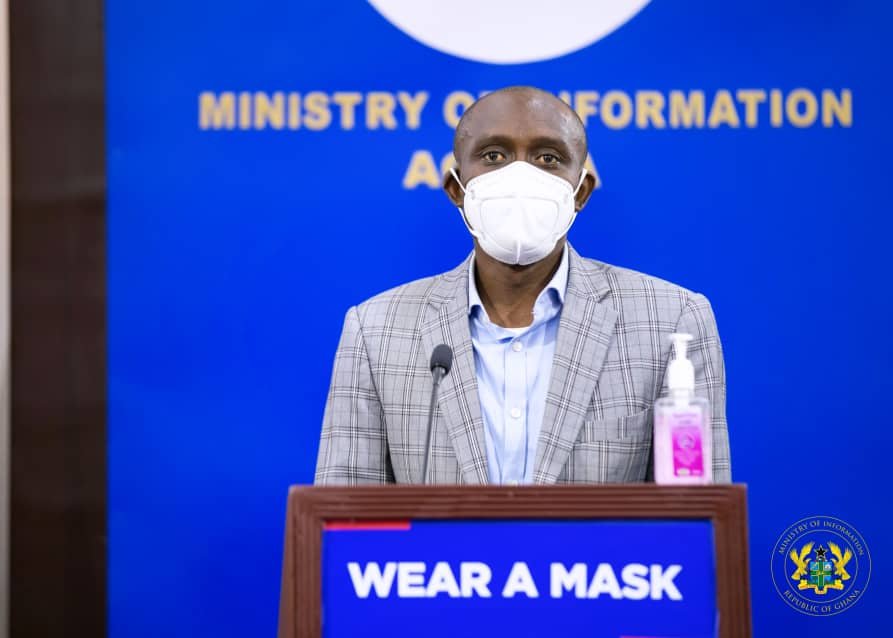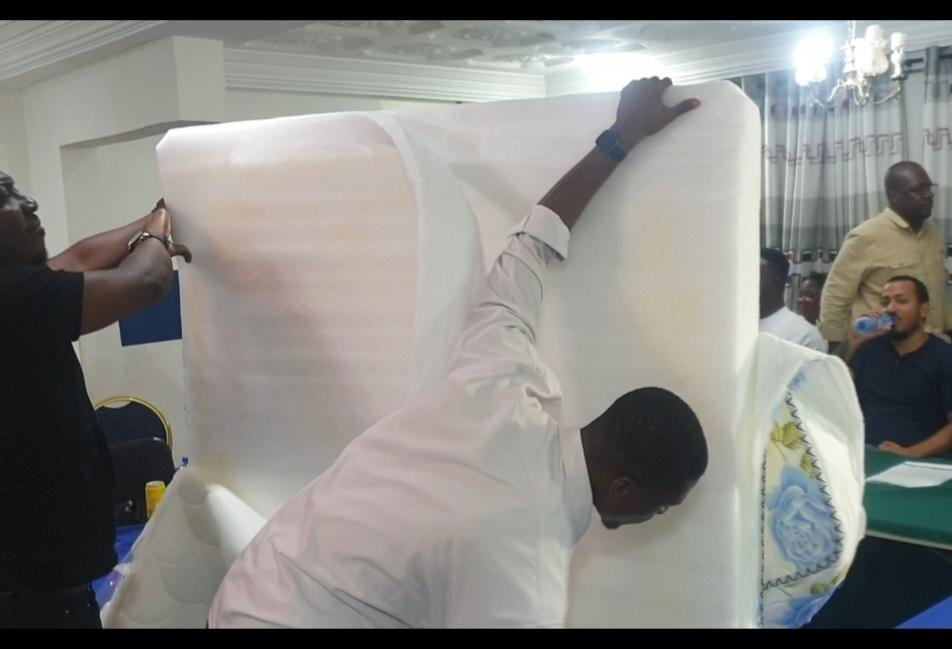News
COVID-19: 624 out of 695 workers of Tema fish processing company test negative

At least 624 out of a total of 695 workers who tested positive for coronavirus (COVID-19) at the Tema-based fish processing company have recovered as the factory prepares to resume operations.
According to the Ghana Health Service (GHS), after all 1,300 employees of the company were tested for the virus, an additional 162 workers were found to have been exposed, resulting in the shutdown of the factory.
It would be recalled that in his last address, President Nana Addo Dankwa Akufo-Addo disclosed that one person had initially infected 533 employees of the fish processing company.
The infections, he indicated, were identified as part of a backlog of nearly 921 cases going back as far as April 26 that was only recently being reported.
Updating the country yesterday following an assessment into the outbreak at the factory, the Head of Disease Surveillance at the Ghana Health Service (GHS), Dr Franklin Asiedu Bekoe said aside non-adherence to social distancing protocols, facilities like a staff bus and clock-in machines had exposed workers to the virus.
“Most of them were asymptomatic and currently we are aggressively identifying contacts of seven people who tested positive because we realise most of the workers live outside Tema and may have infected other people.”
To forestall any occurrence, Dr Bekoe said the GHS had ensured that the factory had in place hand washing facilities; “we have done floor marking to demarcate where people must stand, staff are to wear face mask and placed sanitisers at vantage points.”
“We have also created a holding room at the factory and a temperature check point at the entrance to quickly isolate workers in case of any event and with the level of compliance seen, they are ready to start operations soon,” he said.
In the case of Obuasi in the Ashanti Region, where a trader was said to have infected 17 others at the Obuasi central market, Dr Bekoe indicated that fact-finding visit to the area found, among others, that most individuals refused to wear face masks, “despite how densely populated the area is.”
“Although AngloGold Ashanti has a prominent hospital, we found that they did not have a treatment facility. You also do not see people wearing face masks and there is no holding or quarantine facility,” he observed.
To this end, the Head of Disease Surveillance said the GHS has initiated measures, including a voluntary mass testing programme, for high risk populations to curtail the spread of COVID-19 in the area.
“We are going to carry out enhanced contact-tracing in the very high-risk areas. Obuasi has very densely populated areas like Central Market, Anyinam, Asankore, Wawaso, among others. We are also going to do mass voluntary testing among certain risk groups, including taxi drivers and food vendors as a way of trying to address surveillance and contact management in Obuasi,” he said.
Dr Bekoe announced that in addition to resourcing the Kumasi Centre for Collaborative Research (KCCR) to improve testing, government had secured a 100-bed facility as an isolation centre to help in case management.
Ghana now has 5, 918 confirmed cases of COVID-19, with 1,754 recoveries and 31 deaths.
BY ABIGAIL ANNOH
News
Watch your mattresses!…they can cause chronic back pain, other health disorders

Local mattress manufacturers have raised serious concerns over the influx of substandard mattresses, warning that these products pose significant health risks to consumers and threaten the sustainability of Ghana’s mattress industry.
At a press briefing held in Kumasi on Tuesday, manufacturers accused unregistered foreign entities, particularly Chinese firms, of flooding the market with cheap mattresses made from polystyrene.
Mr Yaw Ampem Darko, a spokesperson for the local manufacturers, warned that prolonged use of substandard mattresses, especially those made with polystyrene, could result in chronic back pain, musculoskeletal disorders, poor posture, and diminished sleep quality.
These health implications, they stressed, were not always immediately evident but accumulate over time, especially among vulnerable populations such as children and the elderly.
This material, typically used for packaging, is considered unsuitable and unsafe for bedding.
According to industry leaders, these sub-standard products have been circulating for at least five years, gaining traction among unsuspecting consumers due to their unusually low prices.
“These mattresses are being sold at suspiciously low prices, luring unsuspecting consumers who are unaware of the health dangers.”
“We are not just protecting our businesses; we are protecting Ghanaian lives. The government must act swiftly to stem this tide before more citizens fall victim to these dangerous products,” Mr Yaw Ampem Darko stated.
The Ghana Standards Authority (GSA) has acknowledged the issue and, in response, announced a nationwide enforcement campaign aimed at clamping down on the production, distribution, and sale of substandard mattresses.
The campaign, which was scheduled to take effect from September 30, 2025, was empowered by the GSA Act, 2022 (Act 1078), which authorises the Authority to seize and seal non-compliant products and impose sanctions on offenders.
In a statement signed by the Director General of the GSA, Professor George Agyei, the authority cited Sections 29 and 43 of the Act, reiterating that all mattresses sold in Ghana must meet established national standards or face confiscation.
The statement further emphasised that mattresses failing to meet these standards not only compromise sleep quality but also contribute to long-term health complications, including spinal and neck pain.
Despite the GSA’s commitment, manufacturers have expressed frustration over delays in implementation and called for stronger enforcement mechanisms.
They urged the GSA to work in close collaboration with the Customs Division of the Ghana Revenue Authority and national law enforcement agencies to identify and prosecute violators of Ghana’s quality standards.
Manufacturers are also appealing to consumers to remain vigilant and prioritise their health by verifying that any mattress they purchase bears the GSA certification mark.
Moreover, they caution the public against purchasing suspiciously cheap mattresses that lack proper labelling or identifiable branding, as these were often indicators of substandard or counterfeit products.
As the official enforcement deadline had expired with no show, the local producers insisted that much more than business interests were at stake.
They argued that without swift and sustained action, the health and safety of Ghanaian consumers would continue to be compromised.
“Public awareness, strict enforcement, and collaboration among regulatory bodies are essential if we are to protect the integrity of the local industry and the wellbeing of the Ghanaian people,” Mr Darko indicated.
From Kingsley E. Hope, Kumasi
Join our WhatsApp Channel now!
https://whatsapp.com/channel/0029VbBElzjInlqHhl1aTU27
News
Raissa Initiative demands harsher punishment for sexual abusers of girls

The Founder of the Raissa Child Protection Initiative, Ms Raissa Sambou, has urged authorities to impose severe punishment on individuals, including teachers and guardians, who sexually abuse young girls.
Speaking in an interview to mark this year’s International Day of the Girl Child (October 11), Ms Sambou condemned the increasing cases of sexual exploitation involving minors, describing such acts as “heartless, criminal, and a total betrayal of trust.”
She noted that those entrusted with the care and education of children must not be the same people who violate them, stressing that “anyone found guilty of abusing a girl child must face the full rigours of the law without leniency.”
The International Day of the Girl Child is observed annually to promote the rights of girls, empower them to reach their full potential, and draw attention to the challenges they face worldwide.
Ms Sambou lamented that poverty continues to push many young girls into vulnerable situations, exposing them to exploitation.
She expressed concern that some headmasters, teachers, and community members who should protect girls rather take advantage of them.
“This must stop immediately. The safety of every girl must never be compromised,” she said, urging the public to report all forms of abuse to the appropriate authorities and called for swift action by law enforcement agencies against perpetrators.
Addressing girls directly, Ms Sambou encouraged them to take their education seriously and to believe in their potential.
“It is possible to be young and responsible. Your future is bright, protect it, believe in it, and never let anyone dim your light,” she advised.
She further urged girls to choose their friends wisely, stay disciplined, and speak up if anyone makes sexual advances toward them.
Ms Sambou concluded with a rallying call for collective action, saying “speak up, protect them, and empower them. Together, we can end the sexual exploitation of girls.”
By Esinam Jemima Kuatsinu
Join our WhatsApp Channel now!
https://whatsapp.com/channel/0029VbBElzjInlqHhl1aTU27






